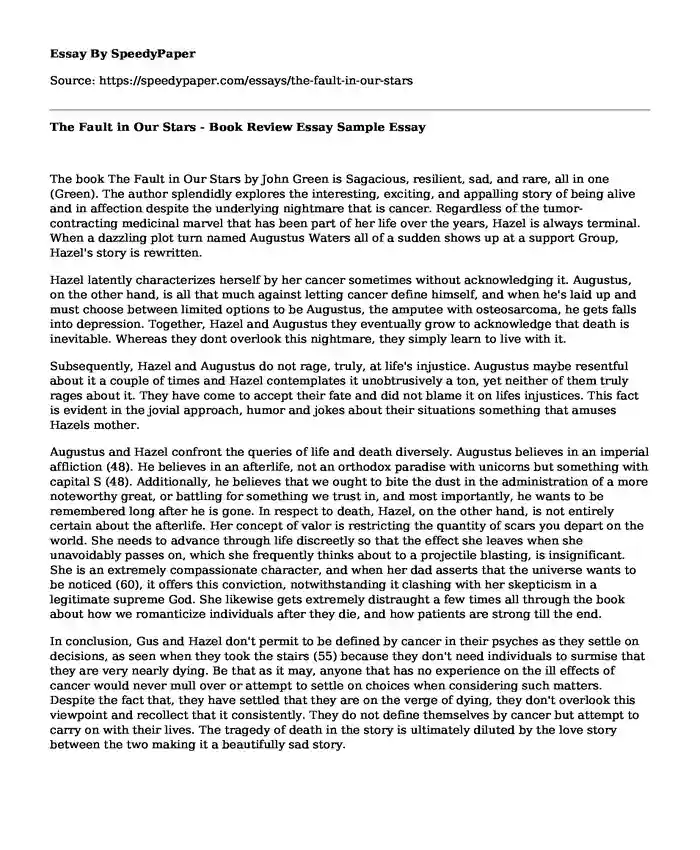
| Type of paper: | Essay |
| Categories: | Reflection American literature |
| Pages: | 3 |
| Wordcount: | 567 words |
The book The Fault in Our Stars by John Green is Sagacious, resilient, sad, and rare, all in one (Green). The author splendidly explores the interesting, exciting, and appalling story of being alive and in affection despite the underlying nightmare that is cancer. Regardless of the tumor-contracting medicinal marvel that has been part of her life over the years, Hazel is always terminal. When a dazzling plot turn named Augustus Waters all of a sudden shows up at a support Group, Hazel's story is rewritten.
Hazel latently characterizes herself by her cancer sometimes without acknowledging it. Augustus, on the other hand, is all that much against letting cancer define himself, and when he's laid up and must choose between limited options to be Augustus, the amputee with osteosarcoma, he gets falls into depression. Together, Hazel and Augustus they eventually grow to acknowledge that death is inevitable. Whereas they dont overlook this nightmare, they simply learn to live with it.
Subsequently, Hazel and Augustus do not rage, truly, at life's injustice. Augustus maybe resentful about it a couple of times and Hazel contemplates it unobtrusively a ton, yet neither of them truly rages about it. They have come to accept their fate and did not blame it on lifes injustices. This fact is evident in the jovial approach, humor and jokes about their situations something that amuses Hazels mother.
Augustus and Hazel confront the queries of life and death diversely. Augustus believes in an imperial affliction (48). He believes in an afterlife, not an orthodox paradise with unicorns but something with capital S (48). Additionally, he believes that we ought to bite the dust in the administration of a more noteworthy great, or battling for something we trust in, and most importantly, he wants to be remembered long after he is gone. In respect to death, Hazel, on the other hand, is not entirely certain about the afterlife. Her concept of valor is restricting the quantity of scars you depart on the world. She needs to advance through life discreetly so that the effect she leaves when she unavoidably passes on, which she frequently thinks about to a projectile blasting, is insignificant. She is an extremely compassionate character, and when her dad asserts that the universe wants to be noticed (60), it offers this conviction, notwithstanding it clashing with her skepticism in a legitimate supreme God. She likewise gets extremely distraught a few times all through the book about how we romanticize individuals after they die, and how patients are strong till the end.
In conclusion, Gus and Hazel don't permit to be defined by cancer in their psyches as they settle on decisions, as seen when they took the stairs (55) because they don't need individuals to surmise that they are very nearly dying. Be that as it may, anyone that has no experience on the ill effects of cancer would never mull over or attempt to settle on choices when considering such matters. Despite the fact that, they have settled that they are on the verge of dying, they don't overlook this viewpoint and recollect that it consistently. They do not define themselves by cancer but attempt to carry on with their lives. The tragedy of death in the story is ultimately diluted by the love story between the two making it a beautifully sad story.
Works Cited
Green, John. The Fault in Our Stars. London: Penguin Books, 2014. Print.
Cite this page
The Fault in Our Stars - Book Review Essay Sample. (2019, Jul 18). Retrieved from https://speedypaper.net/essays/the-fault-in-our-stars
Request Removal
If you are the original author of this essay and no longer wish to have it published on the SpeedyPaper website, please click below to request its removal:
- Essay Example with Annotated Bibliography on Bahamas and Haiti's Health Care Systems
- Property Crime and Typologies, Criminal Law Essay Example
- Free Paper with Essay Review
- Free Essay on Cinematic Invisibility in the Film, "Brokeback Mountain"
- The Victorious Youth Statute - Free Essay Example
- Free Essay Example: Description of Social Norm
- Essay Sample on Key Messages of the IOM Report
Popular categories




